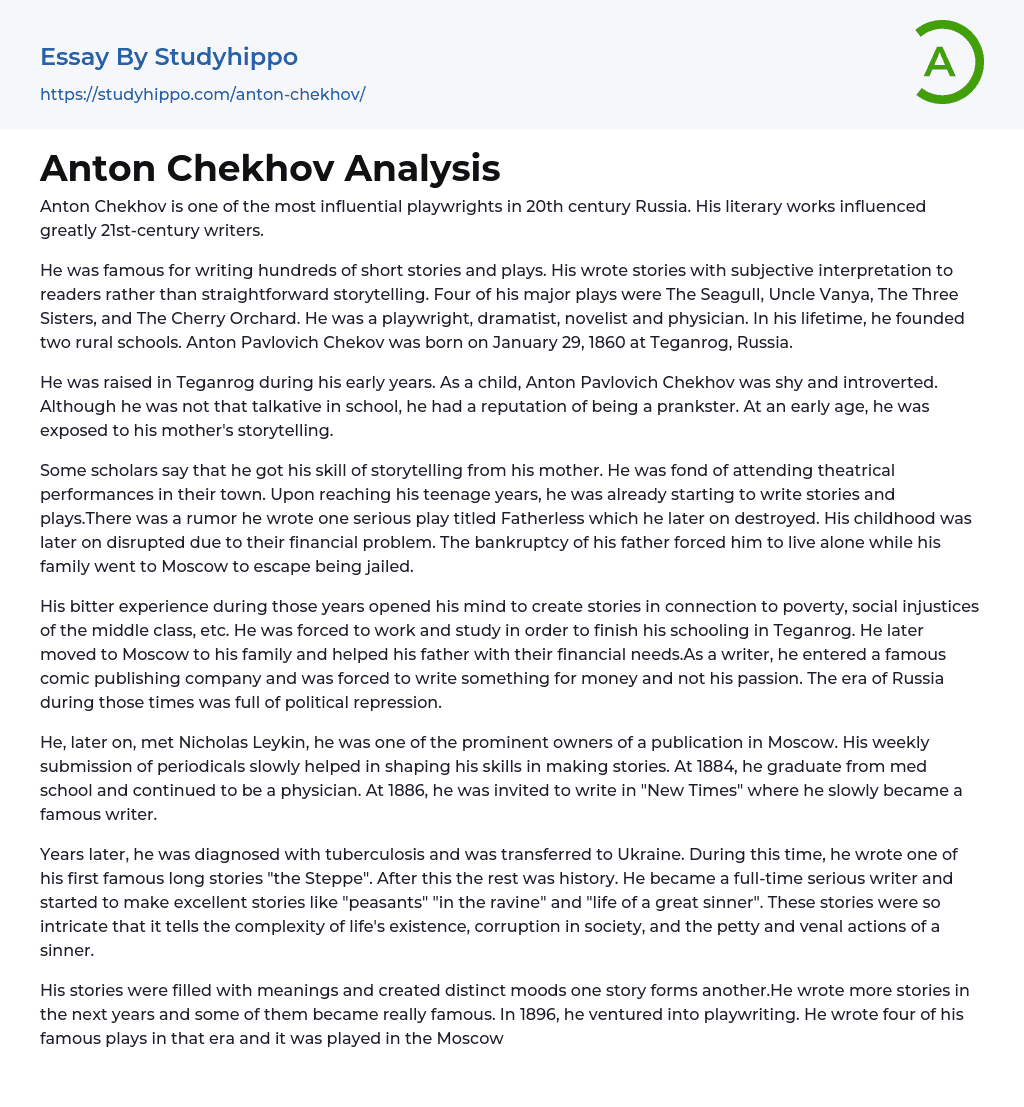Anton Chekhov is one of the most influential playwrights in 20th century Russia. His literary works influenced greatly 21st-century writers.
He was famous for writing hundreds of short stories and plays. His wrote stories with subjective interpretation to readers rather than straightforward storytelling. Four of his major plays were The Seagull, Uncle Vanya, The Three Sisters, and The Cherry Orchard. He was a playwright, dramatist, novelist and physician. In his lifetime, he founded two rural schools. Anton Pavlovich Chekov was born on January 29, 1860 at Teganrog, Russia.
He was raised in Teganrog during his early years. As a child, Anton Pavlovich Chekhov was shy and introverted. Although he was not that talkative in school, he had a reputation of being a prankster. At an early age, he was exposed to his mother's storytelling.
So
...me scholars say that he got his skill of storytelling from his mother. He was fond of attending theatrical performances in their town. Upon reaching his teenage years, he was already starting to write stories and plays.There was a rumor he wrote one serious play titled Fatherless which he later on destroyed. His childhood was later on disrupted due to their financial problem. The bankruptcy of his father forced him to live alone while his family went to Moscow to escape being jailed.
His bitter experience during those years opened his mind to create stories in connection to poverty, social injustices of the middle class, etc. He was forced to work and study in order to finish his schooling in Teganrog. He later moved to Moscow to his family and helped his father with their financial needs.As a writer, he entered a famous comic publishing
company and was forced to write something for money and not his passion. The era of Russia during those times was full of political repression.
He, later on, met Nicholas Leykin, he was one of the prominent owners of a publication in Moscow. His weekly submission of periodicals slowly helped in shaping his skills in making stories. At 1884, he graduate from med school and continued to be a physician. At 1886, he was invited to write in "New Times" where he slowly became a famous writer.
Years later, he was diagnosed with tuberculosis and was transferred to Ukraine. During this time, he wrote one of his first famous long stories "the Steppe". After this the rest was history. He became a full-time serious writer and started to make excellent stories like "peasants" "in the ravine" and "life of a great sinner". These stories were so intricate that it tells the complexity of life's existence, corruption in society, and the petty and venal actions of a sinner.
His stories were filled with meanings and created distinct moods one story forms another.He wrote more stories in the next years and some of them became really famous. In 1896, he ventured into playwriting. He wrote four of his famous plays in that era and it was played in the Moscow art theater. He married later on one of his plays actresses, Olga Leonardovna Knipper.
During his years in writing stories and plays, His tuberculosis further weakened his body. His sickness forced him to move to Nice, France, and died due to further complications on Germany where he was seeking treatment.His stories and plays influence n the world of literature was greatly
felt during the 21st century. His plays were famous for eliciting subjective interpretation to the audience and were not elaborate on dialogues and actions. He wanted to transmit his character's message through indirect means. His plays were not so elaborate and structured like other famous plays but it was filled with essence and meaning.
This is what made him one of the best writers in his era.
Reference
http://people.brandeis.edu/~teuber/chekhovbio.html
Biography
%20Part%20II
- Aldous Huxley essays
- Alice Walker essays
- Amy tan essays
- Anne Bradstreet essays
- Anton Chekhov essays
- Arthur Miller essays
- Augustine essays
- Bertolt Brecht essays
- Booker T Washington essays
- Carol ann duffy essays
- Charles Dickens essays
- Charlotte Perkins Gilman essays
- Chinua Achebe essays
- Christina Rossetti essays
- Consider The Lobster essays
- Edgar Allan Poe essays
- Elizabeth Bishop essays
- Emily Dickinson essays
- Ernest Hemingway essays
- F. Scott Fitzgerald essays
- George Orwell essays
- Harper Lee essays
- Homer essays
- James Baldwin essays
- Jane Austen essays
- John Donne essays
- John Steinbeck essays
- Kate Chopin essays
- Kurt Vonnegut essays
- Langston Hughes essays
- Leonardo Da Vinci essays
- Mark Twain essays
- Mary Shelley essays
- Maya Angelou essays
- Nathaniel Hawthorne essays
- Oscar Wilde essays
- Percy Bysshe Shelley essays
- Peter Skrzynecki essays
- Phillis Wheatley essays
- Poets essays
- Ralph Waldo Emerson essays
- Ray Bradbury essays
- Richard Rodriguez essays
- Robert Browning essays
- Robert Frost essays
- Robert Louis Stevenson essays
- Seamus Heaney essays
- Sherman Alexie essays
- Sophocles essays
- Stephen King essays




